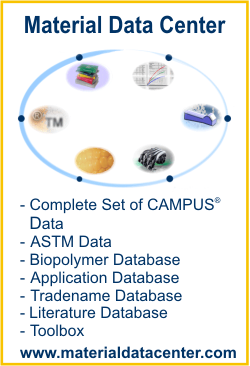Material Data Center is a leading international information system for the plastics industry. Material Data Center offers a comprehensive plastics database, calculation tools, CAE interfaces, a literature database and an application database. For more information about Material Data Center visit www.materialdatacenter.com.
This is the free Material Data Center Datasheet of Ultramid® B3G4 - PA6-GF20 - BASF
unit conversion, PDF datasheet print, comparison with other plastics, snap fit calculation, beam deflection calculation, CAE Interfaces
Check here, which other Ultramid B datasheets, application examples or technical articles are available in Material Data Center
| Mechanical properties | dry / cond | Unit | Test Standard | ||||||||||||||||||||||||||||||||||||||||||||||||||||||||||||||||||||||||||||||||||||||||||||||||
| ISO Data | |||||||||||||||||||||||||||||||||||||||||||||||||||||||||||||||||||||||||||||||||||||||||||||||||||
| Tensile Modulus | 6700 / - | MPa | ISO 527 | ||||||||||||||||||||||||||||||||||||||||||||||||||||||||||||||||||||||||||||||||||||||||||||||||
| Stress at break | 140 / - | MPa | ISO 527 | ||||||||||||||||||||||||||||||||||||||||||||||||||||||||||||||||||||||||||||||||||||||||||||||||
| Strain at break | 4 / - | % | ISO 527 | ||||||||||||||||||||||||||||||||||||||||||||||||||||||||||||||||||||||||||||||||||||||||||||||||
| Flexural modulus, 23°C | 5700 / - | MPa | ISO 178 | ||||||||||||||||||||||||||||||||||||||||||||||||||||||||||||||||||||||||||||||||||||||||||||||||
| Charpy impact strength, +23°C | 60 / - | kJ/m² | ISO 179/1eU | ||||||||||||||||||||||||||||||||||||||||||||||||||||||||||||||||||||||||||||||||||||||||||||||||
| Charpy notched impact strength, +23°C | 8 / - | kJ/m² | ISO 179/1eA | ||||||||||||||||||||||||||||||||||||||||||||||||||||||||||||||||||||||||||||||||||||||||||||||||
| Thermal properties | dry / cond | Unit | Test Standard | ||||||||||||||||||||||||||||||||||||||||||||||||||||||||||||||||||||||||||||||||||||||||||||||||
| ISO Data | |||||||||||||||||||||||||||||||||||||||||||||||||||||||||||||||||||||||||||||||||||||||||||||||||||
| Melting temperature, 10°C/min | 220 / * | °C | ISO 11357-1/-3 | ||||||||||||||||||||||||||||||||||||||||||||||||||||||||||||||||||||||||||||||||||||||||||||||||
| Temp. of deflection under load, 1.80 MPa | 200 / * | °C | ISO 75-1/-2 | ||||||||||||||||||||||||||||||||||||||||||||||||||||||||||||||||||||||||||||||||||||||||||||||||
| Temp. of deflection under load, 0.45 MPa | 215 / * | °C | ISO 75-1/-2 | ||||||||||||||||||||||||||||||||||||||||||||||||||||||||||||||||||||||||||||||||||||||||||||||||
| Coeff. of linear therm. expansion, parallel | 25 / * | E-6/K | ISO 11359-1/-2 | ||||||||||||||||||||||||||||||||||||||||||||||||||||||||||||||||||||||||||||||||||||||||||||||||
| Coeff. of linear therm. expansion, normal | 110 / * | E-6/K | ISO 11359-1/-2 | ||||||||||||||||||||||||||||||||||||||||||||||||||||||||||||||||||||||||||||||||||||||||||||||||
| Electrical properties | dry / cond | Unit | Test Standard | ||||||||||||||||||||||||||||||||||||||||||||||||||||||||||||||||||||||||||||||||||||||||||||||||
| ISO Data | |||||||||||||||||||||||||||||||||||||||||||||||||||||||||||||||||||||||||||||||||||||||||||||||||||
| Volume resistivity | >1E13 / - | Ohm*m | IEC 62631-3-1 | ||||||||||||||||||||||||||||||||||||||||||||||||||||||||||||||||||||||||||||||||||||||||||||||||
| Other properties | dry / cond | Unit | Test Standard |
| Water absorption | 7.6 / * | % | Sim. to ISO 62 |
| Humidity absorption | 2.2 / * | % | Sim. to ISO 62 |
| Density | 1280 / * | kg/m³ | ISO 1183 |
| Bulk density | 700 | kg/m³ | - |
| Material specific properties | dry / cond | Unit | Test Standard | ||||||||||||||||||||||||||||||||||||||||||||||||||||||||||||||||||||||||||||||||||||||||||||||||
| ISO Data | |||||||||||||||||||||||||||||||||||||||||||||||||||||||||||||||||||||||||||||||||||||||||||||||||||
| Viscosity number | 145 / * | cm³/g | ISO 307, 1157, 1628 | ||||||||||||||||||||||||||||||||||||||||||||||||||||||||||||||||||||||||||||||||||||||||||||||||
| Processing Recommendation Injection Molding | Value | Unit | Test Standard |
| Pre-drying - Temperature | 80 | °C | - |
| Pre-drying - Time | 4 | h | - |
| Processing humidity | ≤0.15 | % | - |
| Melt temperature | 270 - 295 | °C | - |
| Mold temperature | 80 - 95 | °C | - |
Pre/Post-processing, max. allowed water content: .15 %
Pre/Post-processing, Pre-drying, Temperature: 80 °C
Pre/Post-processing, Pre-drying, Time: 4 h
PROCESSING
injection molding, Melt temperature, range: 270 - 290 °C
injection molding, Melt temperature, recommended: 280 °C
injection molding, Mold temperature, range: 80 - 90 °C
injection molding, Mold temperature, recommended: 80 °C
injection molding, Dwell time, thermoplastics: 10 min
PREPROCESSING
Max. Water content: 0.12%
Product is supplied in sealed containers and drying prior to molding is not required. If drying becomes necessary, a dehumidifying or desiccant dryer operating at 80 °C (176 °F) is recommended. Drying time is dependent on moisture level.
Further information concerning safe handling procedures can be obtained from the Material Safety Data Sheet. Alternatively, please contact your BASF representative.
PROCESSING
Melt Temperature 270-295 °C (518-563 °F)
Mold Temperature 80-95 °C (176-203 °F)
Injection and Packing Pressure 35-125 bar (500-1500 psi)
This product can be processed over a wide range of mold temperatures; however, for applications where aesthetics are critical, a mold surface temperature of 80-95 °C (176-203 °F) is required.
Injection pressure controls the filling of the part and should be applied for 90% of ram travel. Packing pressure affects the final part and can be used effectively in controlling sink marks and shrinkage. It should be applied and maintained until the gate area is completely frozen off.
Back pressure can be utilized to provide uniform melt consistency and reduce trapped air and gas. A maximum of 3.5 bar (50 psi) is recommended to minimize glass fiber breakage.
Fast fill rates are recommended to insure uniform melt delivery to the cavity and prevent premature freezing. Surface appearance is directly affected by injection rate.
Material Data Center is provided by M-Base Engineering + Software GmbH. M-Base Engineering + Software GmbH assumes no liability for the system to be free of errors. Any decision about the application of materials must be double checked with the producer of this material.
Additional information about this material, like producer contact address, etc. can be found at www.materialdatacenter.com. For access to this extra information a registration is requested. Free online registration is available.













